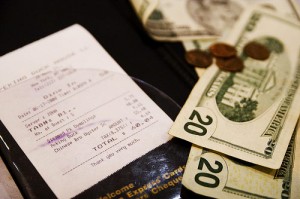It happens a million times. The waiter drops the check. The guest stares at the credit slip with a furrowed brow, twiddling the pen and staring blankly at the empty tip line.
What should I leave them?
Every diner faces the inevitable decision at the end of the meal of how they will tip. It’s a lonely place. They endorse the check quietly worrying to themselves, wondering if they did the right thing.
There have never been any official published guidelines for tipping—it’s always been a very ambiguous custom—which makes it even more difficult for diners to navigate. There are a lot of gray areas in the debate over gratuities; diners are hungry for change and servers are frustrated by inconsistent and unpredictable income. As unpopular as the custom of tipping has become, it begs the question:
Why hasn’t anyone tried to institute reform?
There are many issues impeding change. The same people who want to abolish tipping altogether are not prepared for the inevitable higher prices that would result. Consumers have become accustomed to a particular price point for dishes when they dine out, but those prices are subsidized by the depressed wage levels of tipped employees. Most states allow restaurant owners to pay adjusted hourly rates that are well below state and federal minimum wages. In some states, this can be as low as $2.13 an hour.
Over time, the burden of paying waitstaff has institutionally shifted from the employer to the customer–likely as a way of artificially keeping food prices down and boosting perceived value. Psychologically, you feel better about the price of your meal when the check is 15-20% lower, even when you are customarily expected to leave “extra” for service. But if Front-Of-House (FOH) are paid below minimum wages, should the tip really be viewed as extra? Even though a service charge is rarely included, many diners have come to perceive the tip as an additional tax. Customarily, leaving gratuity is optional and unenforceable by management. When you leave the waitstaff a deficient tip, however, you are essentially flouting payment for the services you received. What other industry allows you to receive services without mandating that you pay for them?
It is considered taboo for a restaurant manager to approach the table after a guest tips poorly. But wouldn’t management insinuate themselves if that person didn’t leave enough money to pay the bill? Tipping customs have evolved so that your tip is considered an evaluation—either punitive or rewarding. Under the current system, a substandard tip would be considered justifiable if service was unsatisfactory. But sometimes people skimp on the tip in order to save on the cost of the meal. They’re just cheap or—especially in the case of foreign guests—they are ignorant of or don’t feel responsible for obeying customs. In this respect, the current system fails. Even those who resent having to tip on top of their check should be required to pay an appropriate premium, however modest, for service if it isn’t included.
 Diners aren’t the only ones to blame for impeding change. Many restaurant workers who receive tips actually prefer that their income be negotiated in an open market. The potential upside of winning the tip lottery is more thrilling and can be infinitely more lucrative than fixed pay. Otherwise, all waiters would work in catering. Waiting tables you feel more like an independent contractor or a commission-based salesperson. Talent will migrate where the tips are highest. Busier restaurants will attract the most tenured staff, struggling ones will be plagued by heavy turnover. Any overhaul to the system would upset these market forces which are deeply entrenched in the industry, in all their dysfunctional glory.
Diners aren’t the only ones to blame for impeding change. Many restaurant workers who receive tips actually prefer that their income be negotiated in an open market. The potential upside of winning the tip lottery is more thrilling and can be infinitely more lucrative than fixed pay. Otherwise, all waiters would work in catering. Waiting tables you feel more like an independent contractor or a commission-based salesperson. Talent will migrate where the tips are highest. Busier restaurants will attract the most tenured staff, struggling ones will be plagued by heavy turnover. Any overhaul to the system would upset these market forces which are deeply entrenched in the industry, in all their dysfunctional glory.
So, what can we do to change the system?
Here are five ideas:
1) Gratuity should no longer be considered optional – Under the current system, menu prices are set artificially lower because restaurant owners can legally pay substandard wages to service employees who are tipped. The “tip credit,” to which it is often referred, evolved out of the determination that gratuities function to make up the difference for any built-in deficiency in hourly wages. However, the system fails when customers skirt their responsibility to tip properly. There may be some cases when service is unsatisfactory and a sub-par gratuity is warranted, but it should be management’s discretion not the guest who decides that a payment for service be withheld. If you are unhappy with a dish in a restaurant, it is ultimately management’s decision whether you pay for it or not—the same should apply to service issues. Every situation is different but there are certainly far too many occasions when an inadequate tip is issued arbitrarily. The bottom line is: If you paid less for your food with the customary understanding that you would leave a gratuity for service, then you should not be allowed to walk away without making an appropriate contribution to compensate those who served you.
2) We should eliminate adjusted minimum wages – The current system is antiquated and is due for a reassessment. According to a recent Op-Ed in the New York Times, tipped employees are twice as likely as other workers to live below the poverty line. Restaurants should not be afforded the opportunity to underpay FOH simply because they receive tips. Hourly wages often go toward helping servers pay taxes on whatever tips they receive. Seattle has recently passed legislation to insure city-wide minimum wages apply to restaurant workers and, as you might imagine, it’s already causing a stir.
3) Diners must learn to accept higher prices – Detractors will say “If FOH wages go up, so will menu prices as restaurant owners are forced to incur higher labor costs.” It’s true, prices will go up. But maybe they should’ve never been so low in the first place. One of the biggest impediments to fixing the system is a consumer who must learn to accept the real cost of dining out. This includes proper compensation of the waitstaff.
4) Guests should not feel pressured to tip on a percentage basis – After ordering an expensive bottle of wine, many diners silently wonder why they are expected to leave a larger tip when all the waiter did was open the bottle and pour it. They usually tip anyway to avoid backlash. But why should a guest tip exorbitantly more money just because they spent more? Conversely, if a table spends less than average on their meal, why is it considered acceptable to leave a smaller tip just because they spent less? Didn’t the server deliver the same services as the big wine check? If minimum wages were raised for tipped employees, it would take some of the pressure off the tenuous relationship that often exists between the guests and staff.
5) Offer more full-time waiters a salary – As more people enter the hospitality industry as a legitimate career it makes sense to have more non-managerial FOH positions that are salaried. Including service charges automatically or adjusting menu prices to subsidize service will create a more consistent pool of revenue for a restaurateur to securely pay his top talent in the dining room. Obviously, it may not work for every restaurant and every situation but there are benefits for both sides if it’s feasible to offer servers more consistent wages.



